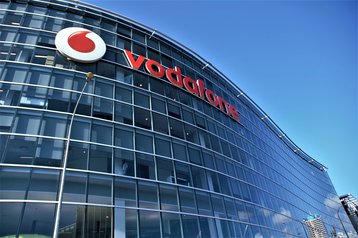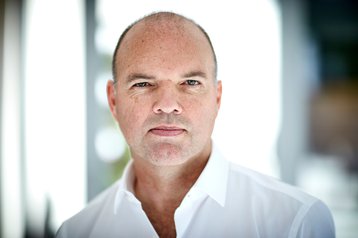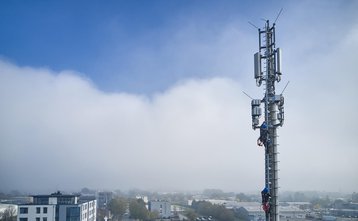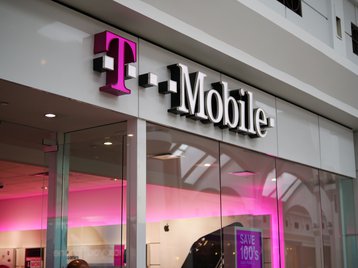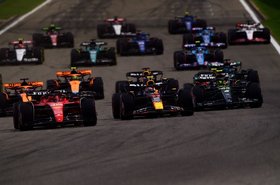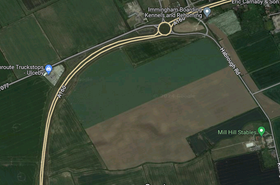The telecoms market loves to consolidate.
We can see it in Europe, where Orange and MásMóvil are set to combine in Spain, and in South Africa where MTN and Rain have been tussling over a merger deal with Telkom, with the former recently pulling out of talks.
And we saw T-Mobile merge with Sprint in 2020, in a bid to compete with AT&T and Verizon in the US.
This feature appeared in the latest issue of the DCD Magazine. Read it for free today.
The next big potential merger on the line could be between Vodafone and Three, in the UK.
There have been rumblings of this potential merger for a while, but in late September, Vodafone confirmed both operators are in advanced talks over a deal, which could potentially value a merger deal between £12 billion to £15bn ($13.4bn to $16.8bn).
In a statement, Vodafone said the envisaged transaction would see Vodafone owning 51 percent of the business, with conglomerate CK Hutchison owning the remaining 49 percent.
"By combining our businesses, Vodafone UK and Three UK will gain the necessary scale to be able to accelerate the rollout of full 5G in the UK and expand broadband connectivity to rural communities and small businesses," Vodafone said in a statement at the time.
The operator also added that the “merged business would challenge the two already consolidated players for all UK customers.”
Vodafone is referring to EE, which merged with BT in 2016, while EE itself was created as Everything Everywhere back in 2012, when Orange and T-Mobile merged.
The other big operator in the UK is of course O2, which merged with Virgin Media in a £31.4bn ($35.3bn) deal last year, in another fusion of mobile and broadband assets where the merger was split 50:50.
So, unlike the other two previously mentioned mergers, this would be different in the sense that it would connect two mobile-specific operators, although Vodafone does boast a sizeable broadband business.
An obvious move
"Confirmation of a potential tie-up between Vodafone and Three comes as no surprise - the two companies have made no secret of their interest to consolidate,” says CCS Insight’s director for consumer and connectivity Kester Mann.
"The leading motivation to join forces is scale. In telecommunications, the most successful companies tend to be the largest; bulking up would offer many synergies and cost-saving opportunities. Under the status quo, it’s hard to see either operator growing enough organically to challenge BT and Virgin Media O2 for size in the UK."
Meanwhile, James Gray, managing director of Graystone Strategy, says the ramped-up discussions and talk of the merger have been the worst-kept secret in the industry.
Gray is uniquely positioned to comment on these talks as he’s worked for both companies. At Vodafone, he worked across a range of marketing roles for a decade between 2002 and 2012. More recently he was a marketing strategy consultant at Three for close to three years until 2020.
He agrees with Mann that a merger would make sense for both operators.
“They do make good complementary partners. Vodafone is more premium than Three and has a strong enterprise base compared to Three’s limited enterprise base.
“Three has a more youthful brand than Vodafone and it appeals to younger data-hungry consumers who are less likely to be found on the Vodafone base.”
Why now?
Understanding how this deal came to be first requires understanding the UK telecoms market. The mergers between EE and BT, and O2 and Virgin Media, have seen these companies increase their connection numbers drastically.
After combining forces last year, Virgin Media O2 now has more than 47 million customers across broadband, mobile, phone, and home subscribers.
Meanwhile, BT and EE, along with broadband provider Plusnet, which was acquired by BT Group in 2007, boast 35 million subscribers, across mobile and broadband services.
In comparison, Vodafone has over 18 million subscribers, although most of which are mobile, bar about 600,000 broadband customers. Three UK has about half this amount, with around 9.3 million customers.
Although the number of connections would still be less than the other big two operators, the number of mobile subscribers will make up the bulk of the combined 27 million plus customers.
Phil Sheppard, formerly director of network strategy and architecture of Three UK and now a self-employed telecoms consultant, says it’s in the interest of both operators to merge, noting that Three UK especially could benefit from the scale that a merger would bring.
“Both parties need this,” he says. “The public analysis of Vodafone is that its UK business is an underperforming market compared to some of its other markets globally and so Vodafone needs to do something about this. As for Three, it’s the smallest operator so it desperately needs some scale in order to perform better. I do think it works for both.”
Sheppard points to a merger between Vodafone and Three in Australia, which provides evidence that a merger between the two groups can be successful in the UK.
“From my viewing of what I’ve seen it was a tricky project to integrate the networks at the time, and had some challenges combining the two networks,” explains Sheppard.
“But once these challenges were overcome, it’s become a scalable enough network for the company. It’s successfully managed to keep trading in the country and has a long-term vision.”
5G is a big asset
It’s worth noting that Three UK has a solid asset at its disposal, and that’s the 5G spectrum the operator has picked up in recent years.
The company has acquired 160MHz of 5G spectrum in total, with 100MHz of this in a contiguous block.
As a result, Three claims to cover 56 percent of the UK with its 5G coverage, as of July 2022. This spans over 400 locations across 3,200 locations.
Sheppard acknowledges Three’s 5G spectrum gains, and notes that Vodafone has a good stock of spectrum in the lower-frequency bands as well.
“I’d say that all the operators have a decent amount of spectrum, so I don’t think the merger is being done purely for this basis,” he said.
“Three’s 5G spectrum holding is very good, slightly better than the others, but then again Vodafone’s low-frequency spectrum holding, which provides the wide area network (WAN) coverage, is better, so I think the combination is good.”
“With the potential merger of Three and Vodafone, the joint company will have access to a large spectrum asset,” said NTT Data UK & Ireland president head of networks Sharad Sharma.
“This will enable a joint venture to take some technologically advanced initiatives around 5G and later 6G, putting the UK at the forefront of tech innovation.
“Moreover, with the joined-up might of two large organizations, we expect to see the expedited rollout of 5G networks and broadband to rural areas. Vital services will benefit from faster connectivity – enabling faster response times, better patient care, and more reliable service all across the public sector in underserved areas.”
Vodafone under pressure to perform
A merger has been on the horizon for some time for Vodafone, with its chief executive Nick Read coming under considerable pressure from shareholders in the past year following disappointing financial performances.
It’s no secret that Vodafone is keen to streamline its business, with a recent investment from French tycoon Xavier Niel, who purchased a 2.5 percent stake in the company.
Niel, who is a founder and major shareholder in French telco Iliad, is keen to pursue consolidation opportunities, further driving speculation that a merger between Vodafone and Three is likely to happen.
The operator recently acquired Portuguese operator Nowo from MasMovil, but has sold off large chunks of business in other markets, notably its Hungarian business unit for $1.8bn in August, its Egyptian unit to Vodacom (in which it owns a large stake), and is reportedly in talks to sell its Ghana business to Telecel Group.
Vodafone Group has also sold off some of its Vantage Towers unit, creating a new joint venture with KKR and Global Infrastructure Partners (GIP) in the process. The deal, which values the towers unit at €16.1 billion ($16.1bn) gives the operator €3.2 billion ($3.2bn) in minimum net cash proceeds, which the operator will use to pay down its debt. The transaction still needs to receive regulatory approval and is expected to close in the first half of 2023.
Meanwhile, Three’s CEO Robert Finnegan has made no secret of his views on a merger deal, and consolidation for the UK market. He’s previously said that the UK market has too many players, and has repeatedly referred to the market as “dysfunctional.”
T-Mobile US blueprint?
But can consolidation be successful for both operators? Even if this does go through, both operators will continue to lag behind the other two for customer numbers.
Still, a similar situation occurred in the US, where the third and fourth biggest operators at the time, T-Mobile and Sprint, merged.
The merger was first proposed in 2018, by the then T-Mobile CEO John Legere and Sprint CEO Marcelo Claure. It was estimated to be worth $23bn once it was finalized in 2020.
This merger has been somewhat of a success, if you note that T-Mobile, which the company is still called, has been driving its 5G deployment, with the operator claiming to cover more than 5,000 cities nationwide with 5G coverage.
The company is also clearly number one for 5G coverage in the US against its rival operators for area coverage, with a report by WhistleOut revealing that its 5G footprint extends to 53 percent of the country. In comparison rival networks AT&T and Verizon are reportedly lagging with 29 percent and 12 percent coverage respectively.
Mann believes that the merger of T-Mobile and Sprint could be a useful blueprint for Vodafone and Three to follow, as the US operators shrunk down from four MNOs to three.
“T-Mobile is on a roll at the moment. It has all that great mid-band spectrum from Sprint, and has been able to roll it out fast. It’s definitely putting pressure on Verizon and AT&T and that’s good for the industry because it puts pressure on the incumbents. I think so far, this is a great example of what a successful merger can be.”
It should also be noted, however, that T-Mobile has laid off a significant number of employees in recent times, something that then-CEO Legere said the company wouldn’t do.
Little is known about what Vodafone and Three’s plans would be, but any merger would see a lot of empty retail spaces on the high street, as four operators dilute into three. Job losses are likely, which the company will say in the name of improving efficiency - but if too aggressive could cause problems.
Sheppard is keen on the idea of consolidation, but only if the impact on consumers is positive.
Approval will be needed
Before any merger deal is completed, there’s a fair bit of scrutiny that needs to be done, especially around the fairness of competition, and all three people DCD spoke to agreed that the Competitions and Market’s Authority (CMA) and UK regulator Ofcom will have a lot to look at.
“Should any deal materialize, regulation would be a major hurdle,” says Mann.
“It would be up to the competition authorities to decide whether reducing the number of players is for the overall good of the market. Advocates will argue it encourages investment; dissenters will claim it’s a reason to push up prices.”
Just a few years ago in 2016, a proposed £10.45bn ($11.7bn) merger between O2 and Three was knocked back by the European Commission, as it would have reduced competition in the UK mobile network operators market.
The decision was overturned in 2020, when CK Hutchison, the parent company of Three appealed that there was no evidence that a merger would hurt competition.
At the time the merger was blocked, and O2 has since merged with another company. Gray, though, believes this time it will be different, noting that the UK is no longer in the EU, while the appetite for consolidation is more appetizing in general.
“The CMA and Ofcom will want to put a lot of scrutiny on this, as the companies are very similar mobile offering businesses. It’s different from the Virgin and O2 merger, with one business being more broadband and the other mobile-focused.
“However, the UK is no longer part of the EU and that deal was referred to the EU for review. This would be a decision made largely in the UK, while this EU decision actually was overturned.”
Gray expects there to be a less aggressive approach from regulators over a potential merger, adding the amount of investment needed for 5G for all the operators is significant and that maybe it’s in everyone’s interests and more sustainable for the market if the two operators merge.
Sheppard points out another potential barrier to a deal, the shared network deals that the operators have in place.
“The complex network sharing deals could be an issue, notably as Vodafone shares with O2, and Three shares with EE, and this involves sharing different pieces of networks, sites, sharing arrangements, and suppliers. They’ll need to work out what to do with that in order for a deal to be approved,” says Sheppard.
The market has consolidated a lot in recent years, even if there has been some resistance to the idea of slimming down choices.
However, there’s been successful showings of consolidation, notably the previously mentioned T-Mobile and Sprint merger.
Gray believes that, although the other UK operators, EE and VirginMedia O2 won’t necessarily welcome a merger, it wouldn’t have come as a surprise to them either.
“They will have watched the speculation, much like we have, and they’d have planned how they will react to this when it happens.
“There may even be a short-term benefit for the other operators as Three and Vodafone will be somewhat distracted initially as they attempt to merge, it will take some time and this could be an opportunity for the other operators to step in and get some customers during this period if the customer experience drops during this merging process,” adds Gray.
Mann expects that the deal will likely go ahead, as does Sheppard.
“If I was to guess on this, I’d say yes, (on whether a deal will happen),” said Sheppard.
“However I’d expect it to be heavily scrutinized and there will be some mitigations put in there that might be complex and difficult. By mitigation, I mean obligations to the other telcos as there are network-sharing deals and potentially some concessions. It should get through this time.”
The Virgin Media and O2 merger was provisionally cleared by the CMA within 12 months of the deal first being announced. It remains to be seen if the same will happen for Vodafone and Three.
Both parties can take encouragement, with Thailand’s regulators approving a recent merger between DTAC and True, and this is one that effectively leaves just two operators jostling for position.
However, this October Virgin Media O2 pulled out of plans to acquire TalkTalk due to market and regulatory uncertainties, with the deal thought to be worth £3 billion ($3.44bn).
It remains to be seen what the outcome will be, but for Vodafone and Three, it might just be a necessary fit to challenge the other two players in the UK.

